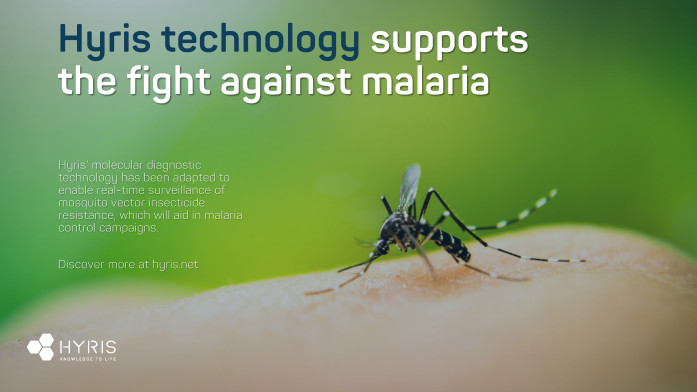Hyris' molecular diagnostic technology has been adapted to enable real-time surveillance of mosquito vector insecticide resistance, which will aid in malaria control campaigns.
LONDON, UK / ACCESSWIRE / February 20, 2024 / Hyris, working with an international team of researchers, has developed a prototype field-deployable surveillance system to detect insecticide-resistant malaria vector mosquitoes in the field without the need for transportation to sophisticated laboratories. The prototype can diagnose a mosquito for insecticide resistance at the field site three or less hours after capture. Current approaches can take up to six months since samples must be collected in remote areas and then transported to centralized laboratories for testing.

Disease vector mosquito
The early and cost-effective detection of mosquito resistance to insecticides is essential for planning and implementing effective malaria control strategies. Mosquito-killing insecticides remain key weapons in preventing malaria transmission in sub-Saharan Africa and other malaria-endemic parts of the world. However, mosquitoes often develop resistance to insecticides, rendering them ineffective in disrupting the spread of the disease.
The research team is led by Professor George Dimopoulos at the Johns Hopkins Bloomberg School of Public Health and the Johns Hopkins Malaria Research Institute, and together with Professor Charles Wondji at the Centre for Research in Infectious Diseases in Yaoundé, Cameroon the team has been working since 2021 conducting laboratory R&D, and field testing in malaria-endemic areas of Cameroon. This is enabled by the distinctive features of the Hyris System™ for molecular testing that is based on a simple portable battery-powered device rather than a heavy laboratory-based benchtop machine.
The newly developed Hyris technology of pre-filled dried cartridges enables running the diagnostic assay by simply adding the mosquito sample to a well already containing all other reagents, simplifying the testing workflow. The stability of the dried reagents enables their storage at room temperature for up to six months thereby not requiring freezers which are lacking at most sample collection sites in the field.
This research project was supported by a Bill & Melinda Gates Foundation grant made to Johns Hopkins University.
"This new test is deployable right in-field," explains Lorenzo Colombo, CTO and Managing Director at Hyris. "Our technology enables researchers to collect a mosquito sample in the field and conduct the molecular diagnostic assay right there, with real-time acquisition, from a central lab, of insecticide resistance data from the disease-endemic area."
The team is currently exploring the path for nationwide deployment of the mosquito insecticide resistance surveillance system in Cameroon, something that would enable real-time informed decision-making on malaria mosquito control campaigns using the most effective insecticides.
Stefano Lo Priore, Founder and CEO at Hyris, further explains the advantages of this new test: "The necessity of cold chain has always been a critical roadblock for any test distribution in remote areas. This new malaria mosquito insecticide resistance test does not require any cold chain for shipping, making it one hundred percent field-deployable." Lo Priore also highlights how such projects perfectly align with Hyris' commitment to developing advanced biotech solutions for critical environments. "We work to provide increasingly efficient ways to manage outbreak readiness and health prevention, especially in the most challenging situations."
For more information, feel free to contact a Hyris specialist at info@hyris.net.
Contact Information
Gabriele Salaris
Global Experience Manager
gabriele.salaris@hyris.net
+39 345 555 3379
SOURCE: Hyris Ltd
View the original press release on newswire.com.
